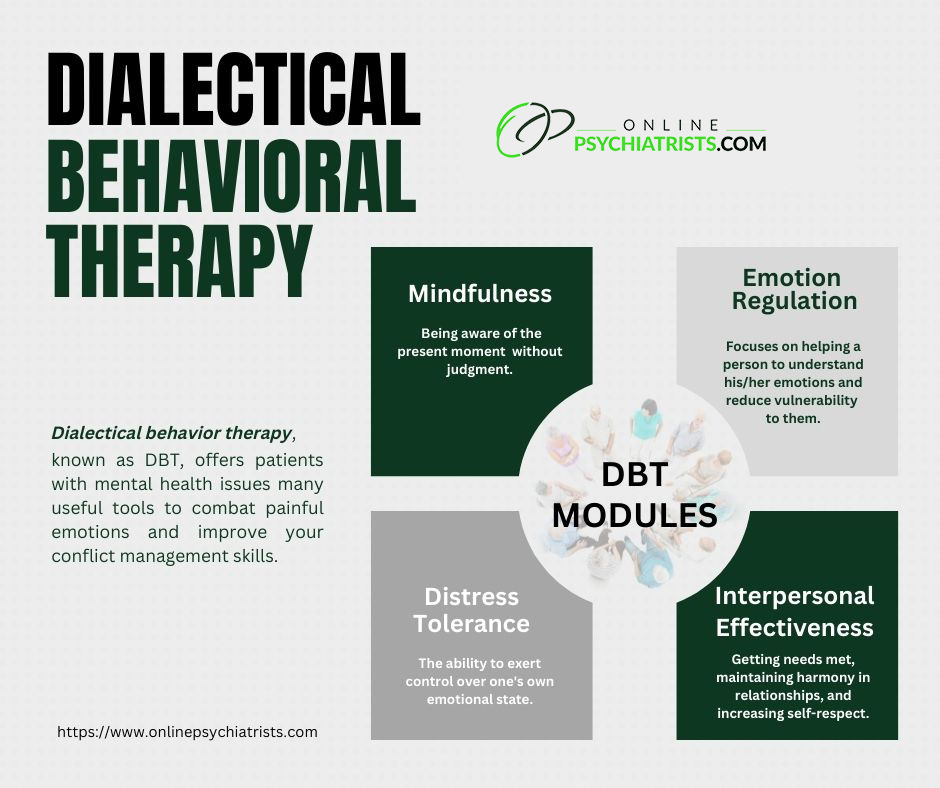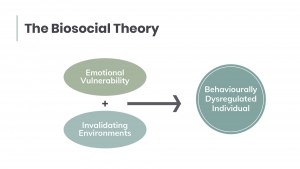Experience Growth and Renewal with DBT London's Proficiency
Experience Growth and Renewal with DBT London's Proficiency
Blog Article
Empowering People Via Effective Dialectical Behavior Therapy (DBT) Providers: Structure Stronger Mental Health Foundations
In the world of psychological health and well-being, the significance of encouraging people with efficient Dialectical Behavior Therapy (DBT) solutions can not be overstated. By focusing on the core concepts of DBT, such as enhancing psychological guideline skills, improving social efficiency, building distress tolerance strategies, and growing mindfulness techniques, individuals can begin on a trip towards building more powerful mental wellness foundations.
Recognizing the Core Concepts of DBT


One core concept of DBT is validation. One more fundamental element is dialectics, which teaches people to check out scenarios from several perspectives and locate the synthesis in between conflicting ideas or feelings.
Additionally, the concept of dialectical abstaining is main to DBT. This concept urges individuals to avoid self-destructive actions while also approving themselves. By understanding and integrating these core concepts, therapists can properly execute DBT techniques and assistance people in their trip in the direction of psychological guideline and mental well-being.
Enhancing Emotional Regulation Skills
Establishing efficiency in handling emotions is an essential aspect of fostering psychological well-being and interpersonal efficiency - DBT London. Enhancing psychological guideline skills is a core element of Dialectical Behaviour Therapy (DBT) that outfits individuals with the tools to navigate extreme emotions in a healthy and balanced and positive manner. Through DBT, individuals discover to recognize, comprehend, and regulate their emotions, leading to boosted mental health and wellness end results
DBT stresses the relevance of mindfulness, which entails existing in the minute without judgment. This method enables individuals to observe their feelings without ending up being overwhelmed by them, enhancing their ability to react properly instead of respond impulsively. By growing mindfulness, individuals can create a better feeling of self-awareness and emotional control.
Moreover, DBT teaches functional skills such as distress resistance and emotion policy strategies to assist people manage difficult emotions. By finding out these abilities, people can minimize impulsive habits, enhance decision-making, and enhance their relationships with others. Ultimately, boosting emotional regulation skills with DBT equips individuals to lead more satisfying and balanced lives.

Improving Interpersonal Effectiveness
Having actually established a solid structure in psychological law skills within the structure of Dialectical Behavior Therapy (DBT), the focus now shifts in the direction of boosting social performance. Improving social efficiency is a crucial component of DBT as it equips individuals with the necessary skills to browse social communications, connect efficiently, set borders, and build much healthier partnerships.
In DBT, interpersonal performance skills are shown with components that concentrate on locations such as assertiveness, reliable communication, and interpersonal problem-solving. By discovering these skills, people can boost their capacity to reveal their desires and demands, preserve self-respect, and construct stronger links with others.
Exercising mindfulness is an important part of enhancing social efficiency within Home Page the DBT structure. Mindfulness allows people to be present in their communications, listen actively, and react attentively instead of respond impulsively. By including mindfulness into useful source their daily lives, people can grow better self-awareness and emotional regulation, which are important for successful social interactions.
Structure Distress Resistance Techniques
Exploring effective techniques for managing emotional distress is necessary for people looking for to boost their coping abilities and strength. Structure distress tolerance techniques is a critical aspect of Dialectical Behaviour Therapy (DBT) that empowers people to navigate challenging emotions without becoming overloaded.
Furthermore, mindfulness techniques play a considerable duty in building distress tolerance. Mindfulness encourages individuals to remain existing in the minute without judgment, enabling them to observe their thoughts and emotions without responding impulsively. This recognition allows individuals to tolerate distress better and create a higher sense of control over their feedbacks.
Along with these methods, creating a customized distress resistance strategy with the advice of a trained specialist can give people with a customized technique to handling psychological distress - DBT London. By incorporating these strategies right into everyday life, individuals can reinforce their mental health and wellness foundations and boost their general wellness

Cultivating Mindfulness Practices
To grow their distress tolerance methods further, individuals can concentrate on growing mindfulness practices as a complementary technique within the structure of Dialectical Behaviour Treatment (DBT) Mindfulness, a vital component of DBT, includes taking notice of the check my reference existing moment without judgment. By cultivating mindfulness, people can enhance their understanding of ideas, feelings, and physical sensations, promoting a deeper understanding of themselves and their experiences.
Mindfulness methods in DBT include strategies such as conscious breathing, body scans, and observing ideas without add-on. These practices motivate people to establish a non-reactive stance towards their inner experiences, allowing them to react to tough scenarios with higher clearness and composure. By incorporating mindfulness right into day-to-day regimens, people can find out to manage their feelings extra effectively, reduce impulsive habits, and grow a feeling of inner peace.
Through growing mindfulness techniques, people undergoing DBT can build a strong structure for taking care of tension, enhancing connections, and improving total wellness. By integrating mindfulness right into their restorative journey, people can establish valuable abilities that equip them to browse life's difficulties with durability and self-awareness.
Conclusion
Finally, reliable Dialectical Behavior Treatment (DBT) solutions play a crucial role in encouraging people to develop stronger mental health and wellness structures. By understanding the core principles of DBT, improving psychological law abilities, boosting social performance, constructing distress tolerance methods, and cultivating mindfulness methods, individuals are geared up with the required tools to browse their feelings, relationships, and difficulties in a much more durable and adaptive fashion. DBT services supply an extensive method to promoting psychological wellness and encouraging people to lead meeting lives.
By focusing on the core principles of DBT, such as improving emotional law skills, boosting social effectiveness, constructing distress resistance strategies, and growing mindfulness practices, individuals can embark on a journey in the direction of building more powerful psychological health foundations. Enhancing emotional guideline abilities is a core part of Dialectical Behaviour Therapy (DBT) that gears up individuals with the tools to navigate intense feelings in a healthy and constructive way.Furthermore, DBT shows sensible skills such as distress resistance and emotion guideline techniques to help individuals manage tough emotions.To deepen their distress resistance techniques even more, people can focus on cultivating mindfulness practices as a corresponding approach within the framework of Dialectical Behaviour Treatment (DBT) By understanding the core principles of DBT, improving emotional policy skills, improving interpersonal performance, constructing distress resistance methods, and cultivating mindfulness practices, individuals are equipped with the necessary devices to browse their feelings, partnerships, and difficulties in a much more adaptive and resilient fashion.
Report this page